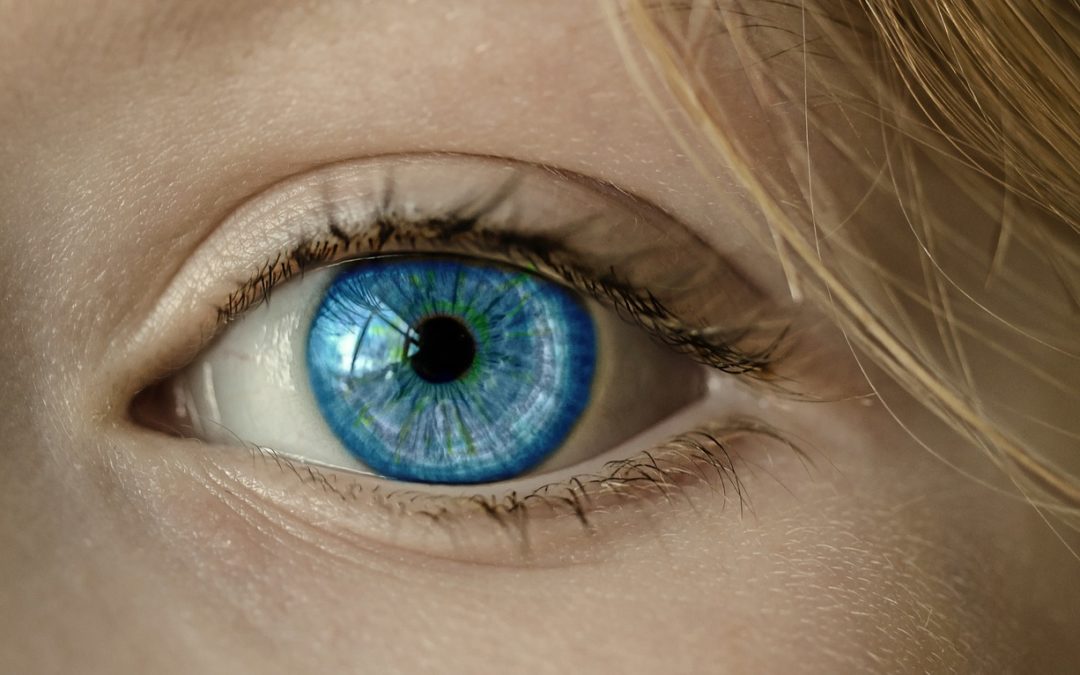Today’s world is full of exciting electronic devices to help us manage our lives. Unfortunately we overuse these devices with blue screens (tablets, smartphones, labtops, Kindles, Nooks, e-readers, etc.), which can often create the environment for eye damage.
Prolonged exposure to our blue screens may contribute to macular degeneration, so it is a good idea to curb that exposure where we can. Senior citizens and immune-compromised individuals are most at risk for loss of vision based on macular degeneration. Good strategies to reduce this risk are this:
- Avoid excessive use of digital devices. Eye pain, headaches, and blurred vision are indicators of excessive exposure to blue light. The American Optometric Association (AOA) recommends the “20-20-20” rule. This translates into taking at least a 20-second break from screen time to view something 20 feet away from you, every 20 minutes.
- Blink often to lubricate and clear particles
- Avoid exclusive blue light frequency (using a device in the dark, such as during bedtime).
- Ensure your work office is well-lit, and take breaks as often as you can.
- Wear sunglasses that block not just UV light but also blue light.
- Visit your eye doctor once/year
- Finding holistic alternatives for medicines with negative optical side effects, like statins.
- Nutritional therapy, which can help minimize this damage and in some cases begin to reverse this damage.
Just like many other age-related health issues, nutritional therapy is one the best paths to improving and sometimes, reversing damages due to macular degeneration. But before I tell you WHAT to eat, it is very important to ensure your body is absorbing what you consume.
Absorption/Digestibility
To help your digestive system be all it can be, ensure you are:
- Eating “clean” (more natural, “God-made” foods and less processed foods). Examples include a simple side salad before a TV dinner, snacks like grapes, celery sticks, or apples before opening a boxed snack.
- The presence of H-pylori bacteria or a bacterial imbalance can take away from eye health. To improve the bacteria balance and microbiome, Consume natural probiotics, prebiotics, and synbiotics. Examples include sauerkraut, kimchee, Kombucha, pickles, black olives, and other raw ferments. If you don’t consume these foods on a regular basis, consider probiotic supplements. Always check with your doctor before making any changes to your diet.
- Reduce or eliminate refined sugars, as they play havoc on your blood-sugar, moods, cravings, immune system, and digestibility. If you are looking for desserts, introduce less sweet foods to your palette with fruit for dessert – a different luscious fruit each night!
- If you are having gastro-intestinal issues (gas, bloating, diarrhea, constipation) or brain fog regularly, consider a food sensitivity test to identify immediate trigger foods, and then eliminate these triggers for 3-6 months to reset your immune system and improve digestibility. Seek out a great nutritional therapist to help you on this journey. Absorption of nutrients is dependent on a well-functioning GI system, so improve eye health by ensuring your gut is optimal.
Optical Nutrients
A balanced diet is always optimal for the whole body in unison; but specifically for repairing your eyes from a surgery or reversing the damage of macular degeneration, there are some nutrients that are critical.
- The carotenoids (lutein, zeaxanthin, and beta-carotene) concentrate in the central part of the retina, and help us identify colors and see fine details, so they are vital in nourishing the macula. They also protect against blue light damage. Sources include egg yolk, kale, spinach, collard and turnip greens lightly steamed, romaine lettuce, broccoli, Brussels sprouts, red and yellow vegetables, and fruits.
- Retinal is a form of vitamin A and it is KEY in vision. It converts energy in light into electrical impulses in the retina.
- Other vitamins that are known to support eye health include Vitamins C and zinc, found abundantly in leafy greens, sweet potatoes, and citrus fruits
- Bile acids are made from cholesterol in the liver and stored in the gallbladder. They break up fat into manageable molecules in digestion. Fat soluble vitamins (like lutein, vitamin A, and the carotenoid family along with others) are carried into the intestine, absorbed by the lymphatic system, and enter the bloodstream from there. So these fat soluble vitamins must be broken down to be absorbed. Thinning the bile is a major key to eye health as it will help more lutein get to the macula. Doing a liver/gall bladder flush can help with this, and it is critical to do this if this organ doesn’t seem to be working optimally.
- Critical nutrients are carried to the macula by cholesterol components (HDL). This means that a healthy HDL (61 or higher) is necessary for improving eye health. Strategies to raise your HDL include :
- Exercise (20-30 minutes of raising your heart rate 3-4 times/week)
- Lose weight (fat-soluble vitamins will store in fat rather than be processed)
- Consume resveratrol daily (grapes, pomegranate, wine)
- Take niacin or fish oil
- Stop smoking
- Replace trans-fats with healthy fats (olive oil, ghee, coconut oil)
- Increasing omega-3 fats can strengthen eye nerves and improve vision.
Resources
https://www.ncbi.nlm.nih.gov/pmc/articles/PMC305368/
https://www.aoa.org/patients-and-public/caring-for-your-vision/diet-and-nutrition?sso=y
http://www.greenmedinfo.com/blog/best-kept-secrets-prevent-halt-or-even-reverse-macular-degeneration



